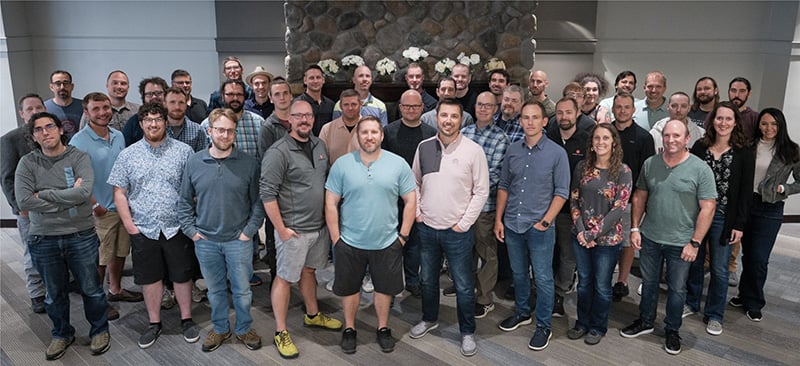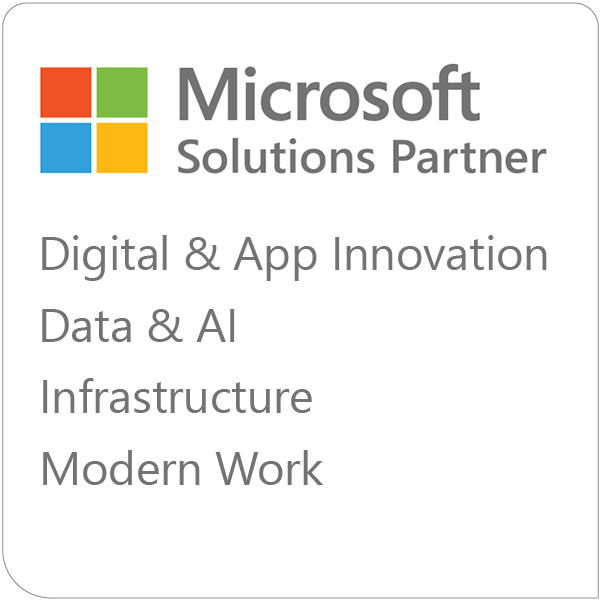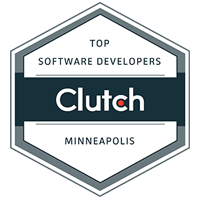We’re proud to announce that Emergent Software recently completed Microsoft’s advanced specialization for Modernization of Web Applications with Microsoft Azure. Read on for more information about what an advanced specialization is, what we did to get it, and what it means for businesses that work with us.
What is a Microsoft Advanced Specialization?
Microsoft offers advanced specializations to allow companies in the Microsoft Cloud Partner Program to demonstrate deep knowledge and extensive experience in a particular area. Earning a Microsoft specialization validates the recipient’s capability to deliver specialized services and support according to Microsoft’s highest technical and procedural standards.
This specialty, the Modernization of Web Applications to Azure, is focused on migrating applications to Azure workloads while following Microsoft’s Cloud Adoption Framework.
The process
Obtaining an advanced specialization isn’t simple—Microsoft is very thorough in evaluating applicants. We had to meet certain criteria to apply and then pass a live audit with a third-party auditing company chosen by Microsoft.
Prerequisites
To obtain this specialization, an organization first has to be a Microsoft partner with an active Solutions Partner designation for Data & AI (Azure) or Digital & App Innovation (Azure) designation (we have both). The company also has to demonstrate that they have delivered relevant Azure services in the last year, including earning an average of $5,000 in revenue from Azure App Service or Azure Spring Cloud Azure consumed revenue (ACR) in the previous three months from at least three customers. Finally, they need to have staff members with the Azure Developer Associate certification, Azure DevOps Engineer Expert certification, and Azure Data Engineer Associate certification.
The audit
The audit for this advanced specialization includes two modules. In Module A: Cloud Foundations, we demonstrated our methodology and process for Azure adoption. This is where the Cloud Adoption Framework comes in. Module B: Modernization of Web Applications with Microsoft Azure workload is more technical—we had to show how we ensure our customers’ success across all phases of deploying web applications.
Here's a brief look at the requirements for the two modules and what we needed to demonstrate. For each point in the checklist, we used documentation from customer case studies to show evidence of our process.
Module A: Cloud Foundations
- Strategy: Our approach to reviewing a customer’s business needs and helping them build a cloud strategy. For example, one of the things we presented was our Strategy and Plan Document. This document is one of the tools that Microsoft emphasizes using as part of the Cloud Adoption Framework.
- Plan: How we plan and track cloud adoption projects, including a plan for skilling (helping our clients prepare their internal team for cloud adoption).
- Environment readiness and Azure landing zone: How our process addresses landing zone implementation, including factors like the adoption of identity management solutions and the implementation of tagging and naming standards.
- Governance: How we use Azure Policy to facilitate our customers’ governance requirements.
- Manage: The steps we take to ensure customer success after the deployment is completed. This involves implementing tools like Azure Monitor, Azure Automation, or Azure Backup/Site Recovery.
To demonstrate our skill at setting up operations management for our clients, we gave a demo of our support and managed services platform. Specifically, we showed how we use Site24x7 for system monitoring and outage alerts, which go into OpsGenie. OpsGenie alerts the right team members, who then take the troubleshooting steps outlined in the runbook.
Module B: Modernization of Web Applications with Microsoft Azure workload
- Assess: Our process for assessing customer requirements for the workload, including how we document their current infrastructure, determine application performance benchmarks, and map dependencies.
- Design: How we take the information from step 1 and design a solution that will better meet the client’s business goals. For this step, we showed our solution design documents, including our Visio diagrams that show customers what their footprint will be in Azure once the workload is migrated.
- Deployment: Our methodologies for deploying a workload, including application modernization, debugging, and app monitoring. In this step, we were required to demonstrate the use of specific Azure tools and core programming skills.
- Review and release for operations: Our process for testing and evaluating the performance of all applications and ensuring the result aligns with customer goals from step 1. We needed to provide sign-off from a few customers on this.
As an example of service validation and testing, we shared the case study of our work with Kalahari Resorts & Conventions. Kalahari needed their website to handle major traffic surges, especially when their float appeared each year in the annual Macy’s Thanksgiving Day Parade. We hosted the new website on Microsoft Azure Cloud Services and used location-based load balancing for a site that scales dynamically to meet the resource need caused by a surge. To test and validate this approach, we load tested the site to ensure that it maintained its performance during the parade.
What does this mean for Emergent Software?
Earning this specialization doesn’t change anything about the way we work on Microsoft Azure projects. Rather, it validates our expertise and experience and helps our clients feel confident that we’re a valuable partner for every step of a cloud migration. We couldn’t have completed this specialization without a proven track record and a deep understanding of the technology and best practices.
An advanced specialization can benefit our clients by strengthening our relationship with Microsoft and unlocking certain programs that can lead to more funding. Not many organizations have this specialization, and fewer than 60 companies of our size have earned it. For clients looking to work with true Azure experts, the advanced specialization sets us apart.
Work with us
Do you have a cloud project coming up? Get in touch to find out how we can help.






